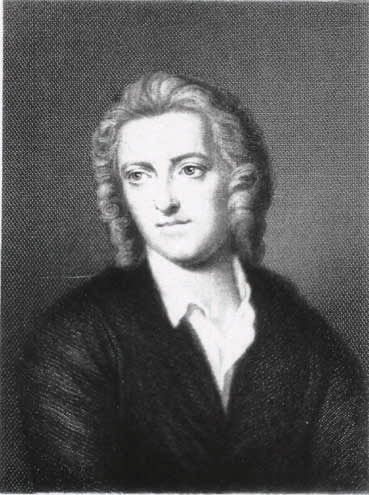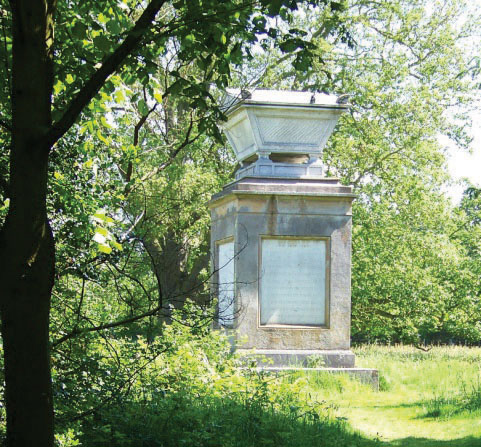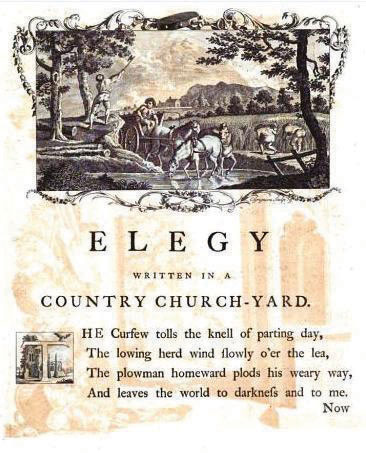This is “Thomas Gray (1716–1771)”, section 5.6 from the book British Literature Through History (v. 0.1). For details on it (including licensing), click here.
For more information on the source of this book, or why it is available for free, please see the project's home page. You can browse or download additional books there. To download a .zip file containing this book to use offline, simply click here.
5.6 Thomas Gray (1716–1771)
PLEASE NOTE: This book is currently in draft form; material is not final.
Learning Objective
- Assess the characteristics of Thomas Gray’s “Elegy Written in a Country Churchyard” that anticipate the Romantic movement.
Biography
Although Thomas Gray had a troubled and less than prosperous childhood—his mother, a milliner, left his father because of abuse—Gray obtained an excellent education at Eton and at Cambridge, largely because of his uncle who was an assistant master at Eton. While at Eton he made friends with young men who were sons of prominent families and who would become prominent themselves. Financed possibly by his father and possibly by his wealthy friends and their families, Gray toured continental Europe and then returned to continue studying independently at Cambridge. Gray lived for a time with his mother in the village of Stoke Poges, and it is believed that he wrote his “Elegy” in the parish churchyard there. He is buried next to the small church with his mother and aunt. At the churchyard in Stoke Poges, a monument has been erected to Gray, whose tomb is also there.


Gray’s monument near the Stoke Poges churchyard.
“Elegy Written in a Country Churchyard”
Although Gray was not a prolific poet, his “Elegy Written in a Country Churchyard” is one of the most well-known and popular poems in the English language. An elegya lament for the dead is a lament for the dead, usually a specific person as in Milton’s elegy Lycidas written to mourn his friend Edward King. Gray’s “Elegy” is more a lament for an entire group of people—the common people of a typical village in England who live simple lives away from the public eye.
Gray is considered part of a group of poets from the late 18th century known as the graveyard schoolpoets who wrote melancholy, meditative poetry about death, poets who wrote melancholy, meditative poetry about death. As part of the graveyard school, Gray writes a melancholy lament for the ordinary people who lie buried in this tiny, obscure location. Stanzas 8, 9, and 14 are well-known stanzas that convey this theme.
Gray’s “Elegy” also is an example of topographical poetrypoetry inspired by a geographical setting—poetry inspired by a geographical setting. British churchyards were typically graveyards, Christians at that time believing they should be buried in hallowed ground. The poem begins with a description of the location, the narrator noting specific details that allow the reader to imagine the scene and at the same time establishing the melancholy mood.
Because of these characteristics, Gray’s “Elegy” is important as a precursor of the Romantic movement which began in the late 18th century. Neoclassical poetry emphasized symmetry, reason, and rational thought—the life of the mind. Gray’s poem marks the beginning of a trend to emphasize organic form, sentiment, and emotion—the life of the heart. The Elegy’s description of nature, its sensitivity to emotion rather than emphasis on reason, and its elevation of common people all intimate important characteristics of 19th century Romanticism.
Text
Elegy Written in a Country Churchyard
The curfew tolls the knell of parting day,
The lowing herd winds slowly o’er the lea,
The ploughman homeward plods his weary way,
And leaves the world to darkness and to me.
Now fades the glimmering landscape on the sight,
And all the air a solemn stillness holds,
Save where the beetle wheels his droning flight,
And drowsy tinklings lull the distant folds:
Save that from yonder ivy-mantled tower
The moping owl does to the moon complain
Of such as, wandering near her secret bower,
Molest her ancient solitary reign.
Beneath those rugged elms, that yew-tree’s shade,
Where heaves the turf in many a mouldering heap,
Each in his narrow cell for ever laid,
The rude Forefathers of the hamlet sleep.
The breezy call of incense-breathing morn,
The swallow twittering from the straw-built shed,
The cock’s shrill clarion, or the echoing horn,
No more shall rouse them from their lowly bed.
For them no more the blazing hearth shall burn,
Or busy housewife ply her evening care:
No children run to lisp their sire’s return,
Or climb his knees the envied kiss to share,
Oft did the harvest to their sickle yield,
Their furrow oft the stubborn glebe has broke;
How jocund did they drive their team afield!
How bow’d the woods beneath their sturdy stroke!
Let not Ambition mock their useful toil,
Their homely joys, and destiny obscure;
Nor Grandeur hear with a disdainful smile
The short and simple annals of the Poor.
The boast of heraldry, the pomp of power,
And all that beauty, all that wealth e’er gave,
Awaits alike th’ inevitable hour:—
The paths of glory lead but to the grave.
Nor you, ye Proud, impute to these the fault
If Memory o’er their tomb no trophies raise,
Where through the long-drawn aisle and fretted vault
The pealing anthem swells the note of praise.
Can storied urn or animated bust
Back to its mansion call the fleeting breath?
Can Honour’s voice provoke the silent dust,
Or Flattery soothe the dull cold ear of Death?
Perhaps in this neglected spot is laid
Some heart once pregnant with celestial fire;
Hands, that the rod of empire might have sway’d,
Or waked to ecstasy the living lyre:
But Knowledge to their eyes her ample page,
Rich with the spoils of time, did ne’er unroll;
Chill Penury repress’d their noble rage,
And froze the genial current of the soul.
Full many a gem of purest ray serene
The dark unfathom’d caves of ocean bear:
Full many a flower is born to blush unseen,
And waste its sweetness on the desert air.
Some village-Hampden, that with dauntless breast
The little tyrant of his fields withstood,
Some mute inglorious Milton here may rest,
Some Cromwell, guiltless of his country’s blood.
Th’ applause of list’ning senates to command,
The threats of pain and ruin to despise,
To scatter plenty o’er a smiling land,
And read their history in a nation’s eyes,
Their lot forbad: nor circumscribed alone
Their growing virtues, but their crimes confined;
Forbad to wade through slaughter to a throne,
And shut the gates of mercy on mankind,
The struggling pangs of conscious truth to hide,
To quench the blushes of ingenuous shame,
Or heap the shrine of Luxury and Pride
With incense kindled at the Muse’s flame.
Far from the madding crowd’s ignoble strife,
Their sober wishes never learn’d to stray;
Along the cool sequester’d vale of life
They kept the noiseless tenour of their way.
Yet e’en these bones from insult to protect
Some frail memorial still erected nigh,
With uncouth rhymes and shapeless sculpture deck’d,
Implores the passing tribute of a sigh.
Their name, their years, spelt by th’ unletter’d Muse,
The place of fame and elegy supply:
And many a holy text around she strews,
That teach the rustic moralist to die.
For who, to dumb forgetfulness a prey,
This pleasing anxious being e’er resign’d,
Left the warm precincts of the cheerful day,
Nor cast one longing lingering look behind?
On some fond breast the parting soul relies,
Some pious drops the closing eye requires;
E’en from the tomb the voice of Nature cries,
E’en in our ashes live their wonted fires.
For thee, who, mindful of th’ unhonour’d dead,
Dost in these lines their artless tale relate;
If chance, by lonely contemplation led,
Some kindred spirit shall inquire thy fate,—
Haply some hoary-headed swain may say,
Oft have we seen him at the peep of dawn
Brushing with hasty steps the dews away,
To meet the sun upon the upland lawn;
‘There at the foot of yonder nodding beech
That wreathes its old fantastic roots so high.
His listless length at noontide would he stretch,
And pore upon the brook that babbles by.
‘Hard by yon wood, now smiling as in scorn,
Muttering his wayward fancies he would rove;
Now drooping, woeful wan, like one forlorn,
Or crazed with care, or cross’d in hopeless love.
‘One morn I miss’d him on the custom’d hill,
Along the heath, and near his favourite tree;
Another came; nor yet beside the rill,
Nor up the lawn, nor at the wood was he;
‘The next with dirges due in sad array
Slow through the church-way path we saw him borne,—
Approach and read (for thou canst read) the lay
Graved on the stone beneath yon aged thorn.’
The Epitaph
Here rests his head upon the lap of Earth
A youth to Fortune and to Fame unknown.
Fair Science frowned not on his humble birth,
And Melacholy marked him for her own.
Large was his bounty, and his soul sincere,
Heaven did a recompense as largely send:
He gave to Misery all he had, a tear,
He gained from Heaven (‘twas all he wish’d) a friend.
No farther seek his merits to disclose,
Or draw his frailties from their dread abode
(There they alike in trembling hope repose),
The bosom of his Father and his God.
Key Takeaways
- Thomas Gray’s “Elegy Written in a Country Churchyard” is one of the more well-known and popular poems in British literature.
- Features of “Elegy Written in a Country Churchyard” such as description of nature, its sensitivity to emotion rather than emphasis on reason, and its elevation of common people make the poem a bridge between neoclassical and Romantic poetry.
Exercises
- In the first line, what connotations do the words curfew, toll, and knell convey?
- In the first four stanzas, what descriptions of the natural world add to the melancholy mood of the poem?
- In stanza 4, to whom does the phrase “the rude forefathers” refer?
- In stanzas 5, 6, and 7, the narrator ponders the simple pleasures that the “rude forefathers” no longer enjoy. What pleasures does he name? How do these stanzas relate to the poem’s theme?
- Paraphrase stanzas 8, 9, and 10. To whom does the narrator address these stanzas?
- The next section of the poem explains that the people born into this obscure village may have had the same natural intelligence, talent, and ability of people who became famous. What prevented the villagers from achieving fame? What advantages came from their failure to achieve prominence?
- In the last 6 stanzas before The Epitaph, what does the narrator imagine happening?
- Many critics have conjectured about the purpose of The Epitaph. What is an epitaph? What do you think is the purpose of this epitaph?

Designs by Mr. R. Bentley for Six Poems by Mr. T. Gray. London: R Dodsley, 1775.
Resources
General Information
- The Thomas Gray Archive: A Collaborative Digital Collection. University of Oxford. primary text, criticism, biography, bibliography, glossary, concordance, images.
Biography
- “Biography.” The Thomas Gray Archive: A Collaborative Digital Collection. University of Oxford.
- “Thomas Gray.” Stoke Poges Parish Council.
- “Thomas Gray (1716–1771).” Anniina Jokinen. Luminarium. rpt. from Encyclopedia Britannica, 11th Ed., Vol. XII. Cambridge: Cambridge University Press, 1910. 395.
Text
- “Elegy Written in a Country Churchyard.” The Thomas Gray Archive: A Collaborative Digital Collection. University of Oxford. annotated text of the poem.
- “Elegy Written in a Country Churchyard.” Representative Poetry Online. Ian Lancashire. Department of English. University of Toronto.
- Select Poems of Thomas Gray by Thomas Gray. Project Gutenberg.
Audio
- “Elegy Written in a Country Churchyard.” The PennSound Anthology of Restoration and 18th-Century Verse. edited and performed by John Richetti. PennSound Center for Programs in Contemporary Writing.
- “Elegy Written in a Country Churchyard.” LibriVox.
Video
- Gray’s “Elegy Written in a Country Churchyard.” Dr. Carol Lowe. McLennan Community College.




